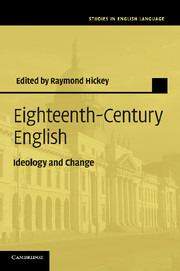Book contents
- Frontmatter
- Contents
- List of figures
- List of maps
- List of tables
- Notes on contributors
- Preface
- 1 Attitudes and concerns in eighteenth-century English
- 2 Prescriptivism and the suppression of variation
- 3 Women's grammars
- 4 Eighteenth-century women and their norms of correctness
- 5 Lowth as an icon of prescriptivism
- 6 Queeney Thrale and the teaching of English grammar
- 7 Coalitions, networks, and discourse communities in Augustan England: The Spectator and the early eighteenth-century essay
- 8 Contextualising eighteenth-century politeness: social distinction and metaphorical levelling
- 9 Expressive speech acts and politeness in eighteenth-century English
- 10 Variation and change in eighteenth-century English
- 11 Variation in sentential complements in eighteenth- and nineteenth-century English: a processing-based explanation
- 12 Nationality and standardisation in eighteenth-century Scotland
- 13 English in eighteenth-century Ireland
- 14 Changes and continuities in dialect grammar
- 15 ‘Be pleased to report expressly’: the development of a public style in Late Modern English business and official correspondence
- 16 Registering the language – dictionaries, diction and the art of elocution
- Timeline for the eighteenth century
- References
- Late modern English language studies
- Indexes
15 - ‘Be pleased to report expressly’: the development of a public style in Late Modern English business and official correspondence
Published online by Cambridge University Press: 06 December 2010
- Frontmatter
- Contents
- List of figures
- List of maps
- List of tables
- Notes on contributors
- Preface
- 1 Attitudes and concerns in eighteenth-century English
- 2 Prescriptivism and the suppression of variation
- 3 Women's grammars
- 4 Eighteenth-century women and their norms of correctness
- 5 Lowth as an icon of prescriptivism
- 6 Queeney Thrale and the teaching of English grammar
- 7 Coalitions, networks, and discourse communities in Augustan England: The Spectator and the early eighteenth-century essay
- 8 Contextualising eighteenth-century politeness: social distinction and metaphorical levelling
- 9 Expressive speech acts and politeness in eighteenth-century English
- 10 Variation and change in eighteenth-century English
- 11 Variation in sentential complements in eighteenth- and nineteenth-century English: a processing-based explanation
- 12 Nationality and standardisation in eighteenth-century Scotland
- 13 English in eighteenth-century Ireland
- 14 Changes and continuities in dialect grammar
- 15 ‘Be pleased to report expressly’: the development of a public style in Late Modern English business and official correspondence
- 16 Registering the language – dictionaries, diction and the art of elocution
- Timeline for the eighteenth century
- References
- Late modern English language studies
- Indexes
Summary
Introduction: issues in method and terminology
In line with other contributions in this volume, this chapter will concentrate on the pragmatic strategies employed by encoders to convey their messages in a socially acceptable way; in particular, I intend to focus on business and official communication, in an attempt to identify patterns in the development of ‘public style English’. Although numerous studies have already appeared on the development of scientific English, especially in Early Modern times, it is only much more recently that attention has been given to the roots of business English (Dossena and Fitzmaurice 2006). Indeed, such investigations have shown that encoders appear to adapt their self-representation in relation to the purpose of their communication and the presupposed status of the recipient (not necessarily coinciding with actual status: see Dossena 2008a, 2008b and 2010).
Such pragmatic strategies will be analysed in a broad range of texts, encompassing the last decades of the eighteenth century and the very beginning of the twentieth century, giving special attention to the keywords employed in official exchanges. The aim is to identify the elements that could characterise the ‘public’ style of the time, especially as far as evaluation is concerned. The chapter will rely mainly, though not exclusively, on the letters currently being transcribed for inclusion in the Corpus of Nineteenth-Century Scottish Correspondence (henceforth 19CSC – see Dossena 2004 and Dury 2006); this will also allow me to comment (albeit briefly) on the diffusion of Scottish Standard English in such texts.
- Type
- Chapter
- Information
- Eighteenth-Century EnglishIdeology and Change, pp. 293 - 308Publisher: Cambridge University PressPrint publication year: 2010
- 10
- Cited by



